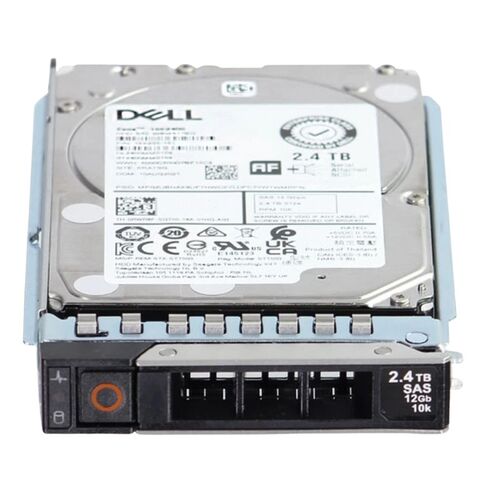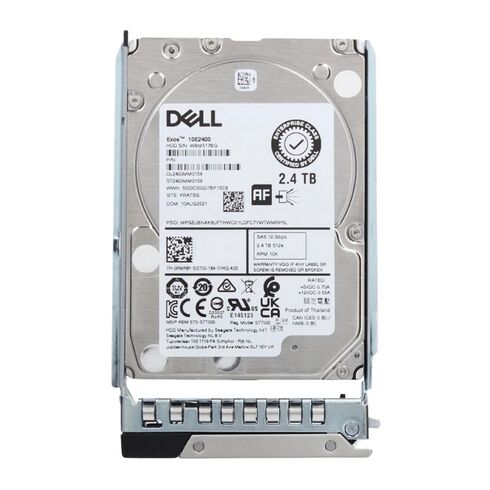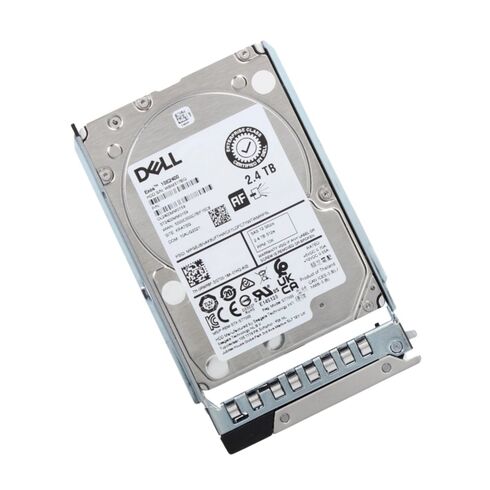RYJ1W Dell 2.4TB 10K RPM SAS-12GBPS 512E 256MB Server Hard Drive
- — Free Ground Shipping
- — Min. 6-month Replacement Warranty
- — Genuine/Authentic Products
- — Easy Return and Exchange
- — Different Payment Methods
- — Best Price
- — We Guarantee Price Matching
- — Tax-Exempt Facilities
- — 24/7 Live Chat, Phone Support
- — Visa, MasterCard, Discover, and Amex
- — JCB, Diners Club, UnionPay
- — PayPal, ACH/Bank Transfer (11% Off)
- — Apple Pay, Amazon Pay, Google Pay
- — Buy Now, Pay Later - Affirm, Afterpay
- — GOV/EDU/Institutions PO's Accepted
- — Invoices
- — Deliver Anywhere
- — Express Delivery in the USA and Worldwide
- — Ship to -APO -FPO
- — For USA - Free Ground Shipping
- — Worldwide - from $30
Overview
Product Details
- Brand: DELL
- Manufacturer Part Number: RYJ1W
- DELL Part Number: 400-avcn
- Type: Internal Hard Disk Drive
Technical Specifications
Storage Attributes
- Capacity: 2.4 Terabytes
- Form Factor: 2.5 Inches
- Interface Type: SAS 12 Gb/s
- Cache Memory: 256 Megabytes
- Sector Size: 512e
Performance Metrics
- Rotational Speed: 10,000 RPM
- Mean Latency: 2.9 ms
- Sustained Transfer Rate: 270 MB/s (outer diameter) to 117 MB/s (inner diameter)
- Cache Multisegmented: 256 MB
- External Transfer Rate: 1200 Mbps
Advanced Caching Features
Optimization and Management
- I/O Acceleration: Enabled for enhanced response time
- NAND Flash Type: EMLC
- NAND Flash Size: 16 GB
- Intelligent NAND Endurance Management: Yes
Expansion and Connectivity Options
Interface and Compatibility
- Interfaces: 1 x SAS 12 Gb/s
- Compatible Bays: 1 x Hot-swap - 2.5 Inch
Capacity: 2.4TB
When it comes to storage, having ample capacity is crucial for businesses and individuals alike. The Dell RYJ1W Server Hard Drive offers an impressive capacity of 2.4TB, providing users with an abundance of space to store their valuable data. Whether you're running a small business with limited storage needs or managing a large enterprise with extensive data requirements, this high-capacity hard drive is designed to meet your demands.
Benefits of 2.4TB Capacity
Having a large storage capacity offers numerous benefits for users:
1. Storage Flexibility
With 2.4TB of space, you can store a wide range of files, including documents, images, videos, and applications. This flexibility allows you to keep all your important data in one place, making it easily accessible whenever you need it.
2. Improved Performance
By having a larger capacity hard drive, you can optimize performance by avoiding the need for multiple drives or external storage solutions. This reduces the time spent searching for files and enhances overall system efficiency.
3. Future-Proofing
In today's data-driven world, the demand for storage is constantly increasing. By investing in a 2.4TB hard drive, you can future-proof your storage needs and ensure that you have sufficient space for future data growth.
Importance of 2.4TB Capacity
The importance of having a high-capacity hard drive like the Dell RYJ1W cannot be overstated:
1. Data-intensive Applications
In industries such as media production, architecture, and scientific research, where large file sizes are the norm, a 2.4TB capacity is essential. It allows professionals to work with data-intensive applications without worrying about running out of storage space.
2. Server Environments
For businesses that rely on servers to store and manage their data, a 2.4TB hard drive provides ample room for multiple virtual machines, databases, and other critical server resources.
3. Backup and Disaster Recovery
Having a large-capacity hard drive is crucial for creating backups and implementing disaster recovery strategies. With 2.4TB, you can easily and efficiently store and manage multiple backup copies of your important files, ensuring their safety in the event of data loss.
Speed: 10KRPM
In addition to capacity, speed is another critical factor to consider when choosing a server hard drive. The Dell RYJ1W offers an impressive speed of 10KRPM (10,000 revolutions per minute), providing users with fast and efficient data access and transfer speeds.
Benefits of 10KRPM Speed
Here are some of the benefits you can expect from a high-speed hard drive:
1. Improved Performance
A faster rotational speed translates to reduced latency and improved read/write speeds. This means that data retrieval and transfer operations will be completed more quickly, resulting in improved overall system performance.
2. Reduced Downtime
In server environments where every second counts, having a high-speed hard drive can significantly reduce downtime. With faster access to data, applications can run more smoothly, minimizing interruptions and maximizing productivity.
3. Enhanced User Experience
Whether you're using the hard drive for personal or business purposes, a 10KRPM speed ensures a smoother and more responsive user experience. Applications load faster, files open quickly, and data transfers are completed in a fraction of the time compared to slower drives.
Importance of 10KRPM Speed
Speed is crucial in various scenarios, and the Dell RYJ1W Server Hard Drive's 10KRPM speed is particularly important in the following situations:
1. Database Servers
In database server environments, where quick access to large amounts of data is essential, a high-speed hard drive can significantly improve query response times. This ensures that critical business operations run smoothly without any performance bottlenecks.
2. Virtualization
In virtualized environments, where multiple virtual machines are running simultaneously, a fast hard drive is crucial for efficient resource allocation and seamless performance. With a 10KRPM speed, you can ensure that virtual machines operate smoothly, without lag or delays.
3. Video Editing and Gaming
If you're a video editor or a gamer, you know how important it is to have a high-performance hard drive. With faster read/write speeds, you can seamlessly edit and render videos or load games faster, providing a smooth and immersive experience.
Interface: SAS-12GBPS
The interface of a server hard drive determines how it connects to the rest of your system and influences data transfer speeds. The Dell RYJ1W Server Hard Drive utilizes the SAS-12GBPS interface, providing users with fast and reliable data connectivity.
Benefits of SAS-12GBPS Interface
The SAS-12GBPS interface offers several benefits that enhance the overall performance and reliability of the hard drive:
1. High Data Transfer Rates
With a SAS-12GBPS interface, the hard drive can achieve faster data transfer rates compared to older interfaces. This is particularly beneficial in server environments that require quick access to large amounts of data.
2. Scalability and Flexibility
The SAS-12GBPS interface allows for easy scalability and flexibility in storage configurations. It supports multiple drives and enables efficient data sharing across a network, making it ideal for businesses with growing storage needs.
3. Error Detection and Correction
SAS interfaces incorporate advanced error detection and correction mechanisms, ensuring data integrity and reducing the risk of data loss or corruption. This provides users with peace of mind, knowing that their critical data is protected.
Importance of SAS-12GBPS Interface
The SAS-12GBPS interface is particularly important in the following scenarios:
1. Enterprise Storage Solutions
For businesses that require high-performance storage solutions, such as RAID arrays or SANs (Storage Area Networks), the SAS-12GBPS interface offers the necessary speed and reliability to handle large-scale data storage and retrieval operations.
2. Data-Intensive Applications
In industries where data-intensive applications are the norm, such as scientific research or financial analysis, a fast and reliable interface like SAS-12GBPS is crucial. It ensures that large datasets can be processed quickly and efficiently.
3. Virtualization Environments
In virtualized environments, where multiple virtual machines access shared storage resources simultaneously, a high-speed interface is essential to prevent performance bottlenecks and ensure optimal resource allocation.
Sector Size: 512E
The sector size of a hard drive determines the unit of data storage and impacts the efficiency of data access and retrieval. The Dell RYJ1W Server Hard Drive features a sector size of 512E, providing users with efficient and reliable storage capabilities.
Benefits of 512E Sector Size
The 512E sector size offers several benefits that enhance the performance and compatibility of the hard drive:
1. Compatibility
The 512E sector size is widely supported by various operating systems, making it compatible with a wide range of systems and applications. This ensures seamless integration into existing infrastructures without requiring additional configuration or software updates.
2. Data Efficiency
A smaller sector size results in more efficient data storage and reduces wasted disk space. By utilizing 512-byte sectors, the Dell RYJ1W Hard Drive maximizes storage capacity and improves overall efficiency.
3. Performance Optimization
The 512E sector size allows for faster data access and retrieval times compared to larger sector sizes. This is particularly beneficial in scenarios where quick access to data is crucial, such as database servers or virtualized environments.
Importance of 512E Sector Size
Having a 512E sector size is important in various situations:
1. Legacy Systems
If you're working with older systems or applications that are not compatible with larger sector sizes, a hard drive with a 512E sector size ensures seamless integration without requiring additional configuration or software updates.
2. Data Recovery and Migration
In scenarios where data recovery or migration is necessary, a hard drive with a 512E sector size simplifies the process. It allows for easier data extraction and transfer, ensuring that important files can be accessed and restored efficiently.
3. Virtualized Environments
In virtualized environments, a hard drive with a 512E sector size ensures compatibility and efficient resource allocation. It allows for seamless integration with virtualization platforms, ensuring optimal performance and data access speeds.
Cache: 256MB
The cache size of a hard drive plays a crucial role in improving data access speeds and overall system performance. The Dell RYJ1W Server Hard Drive features a cache size of 256MB, providing users with enhanced data caching capabilities.
Benefits of 256MB Cache Size
A larger cache size offers several benefits that enhance hard drive performance:
1. Faster Data Access
A larger cache allows the hard drive to store frequently accessed data, reducing the need to retrieve it from the slower main storage area. This results in faster data access speeds and improved overall system responsiveness.
2. Improved Read/Write Performance
The cache acts as a buffer between the hard drive and the system, allowing for faster read and write operations. By temporarily storing data in the cache, the Dell RYJ1W Hard Drive can optimize read/write performance, especially in scenarios with multiple simultaneous requests.
3. Smoother Multi-Tasking
With a larger cache size, the hard drive can handle multiple simultaneous requests more efficiently. This is particularly useful in environments where multi-tasking is common, such as server environments or systems running resource-intensive applications.
Importance of 256MB Cache Size
The cache size is particularly important in the following scenarios:
1. Database Applications
In database applications, where quick data retrieval is crucial, a larger cache size can significantly improve performance. It allows for faster access to frequently accessed data, reducing query response times and improving overall database efficiency.
2. Gaming and Multimedia
For gamers and multimedia enthusiasts, a larger cache size can enhance gaming and multimedia experiences. It allows for faster loading times, smoother playback, and reduced lag, ensuring a more immersive and enjoyable experience.
3. Virtualized Environments
In virtualized environments, where multiple virtual machines access shared storage resources, a larger cache size can prevent performance bottlenecks and ensure optimal resource allocation. It allows for efficient handling of simultaneous read/write requests from multiple virtual machines.













